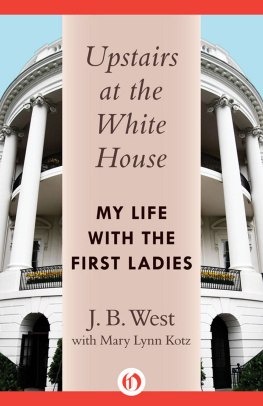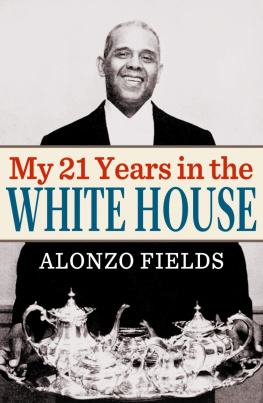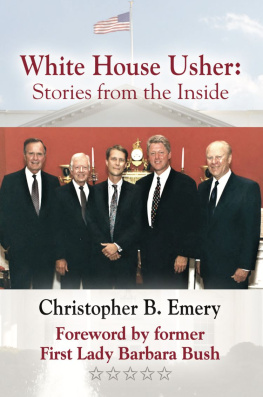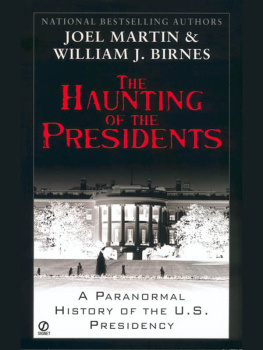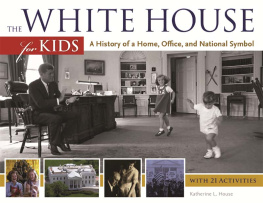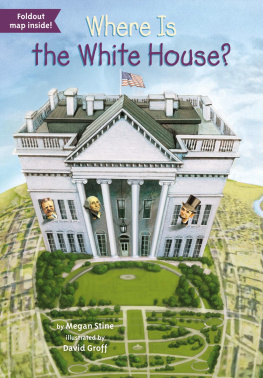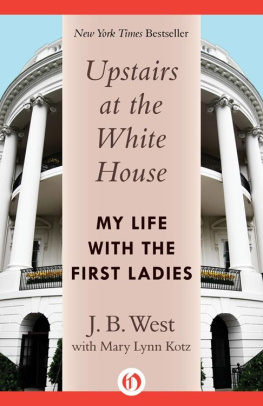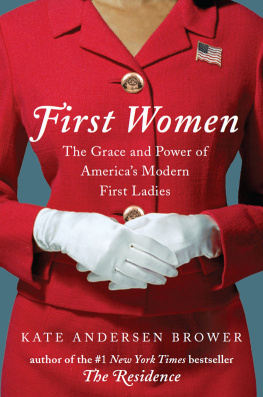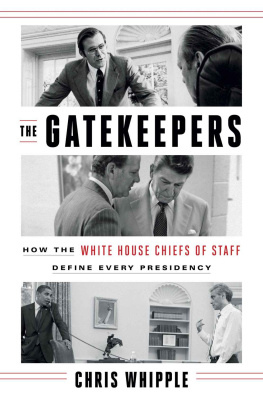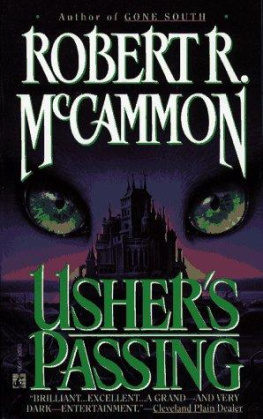
Upstairs at the White House
My Life with the First Ladies
J. B. West with Mary Lynn Kotz

For KATHY and SALLY
Foreword
ON MARCH 1, 1941, after my first day at work in the White House, I started to keep a diary. It was short-lived, however, because as the days became more frantic and filled with more responsibilities, and the working hours longer, I decided that I didnt want to relive each day.
And from that day until I retired on March 1, 1969, it was never my intention to write a book. Howell G. Crim, Chief Usher of the White House from 1933 to 1957 (when I was promoted to the position), had always said, when asked if he would write his memoirs, Im not the type to kiss and tell, although he was an avid reader of 42 Years in the White House by Irwin H. (Ike) Hoover, the first Chief Usher.
That book, covering the years from 1891 to 1933, has been cited as a mine of information by historians and authors. Since retirement, I have been encouraged by numerous peopleincluding some First Ladiesto add my more recent recollections to bring the story up to date. That I have attempted to do. If this book is of some help to future historians, then my efforts will have accomplished my purpose.
I am most grateful to all those who gave me encouragement and assistance, most of whom are mentioned in the text.
I also wish to cite all of the dedicated, selfless people who staff the Presidents Houseushers, housekeepers, butlers, maids, chefs, cooks, doormen, housemen, florists, gardeners, electricians, plumbers, storekeepers, engineerseach one of whom has a passion for anonymity. And I apologize profusely to those few whose names I have had to use in telling a story.
Many times I was asked, What does the Chief Usher do? I usually replied, I do what Im told to do. Also I received many letters from students asking what educational background would be helpful for a job as Usher at the White House. I could only reply that experience on the job was the main requirementsince its duties are unique; no other government or civilian establishment offers a comparable position. And how to get this experience? To be at the right place at the right time, and have a lot of luck.
The title Chief Usher is a holdover from early times, when the principal duty was ushering expected visitors in to see the President and the First Lady. In recent years many have tried to change the title, but to date nobody has come up with an appropriate appellation.
To give you a better idea of what the job encompasses, I quote from the official U.S. Civil Service Commission Position Description form:
Subject only to the general direction of the President of the United States, serves as Chief Usher of the White House. As such is the general manager of the Executive Mansion, and is delegated full responsibility for directing the administrative, fiscal, and personnel functions involved in the management and operation of the Executive Mansion and grounds, including construction, maintenance, and remodeling of the Executive Mansion.
Is responsible for the preparation and justification of budget estimates covering administrative and operating expenses, and for the construction and maintenance projects of the Executive Mansion , as well as for the allotment, control, and proper expenditure of funds appropriated for these purposes.
Is responsible for the direction and supervision of the activities of approximately one hundred employees of the Presidents household including their selection, appointment, placement, promotion, separation, disciplinary action, etc. In addition, exercises responsibility over the mechanical and maintenance forces in connection with the maintenance and repair of buildings and grounds.
Serves as the receptionist at the White House, and as such is responsible for receiving and caring for all personal and official guests calling on the President or the First Lady. These guests include, among others, members of the Congress and their families, members of the Judicial Branch, governors, foreign dignitaries, and heads of state. Is responsible for arranging for accommodations for houseguests, their comfort, their acquaintance with the customs of the household, etc. Is responsible and arranges for all personal and official entertainments, receptions, dinners, etc., in the Executive Mansion, which frequently include the heads of sovereign states, and several hundred persons. Is responsible for the procurement of all food consumed by the Presidents family and their guests. Makes personal appointments for the President and other members of his official family.
Is responsible for answering a large volume of correspondence regarding the Executive Mansion, its history and furnishings, historical subjects, sightseeing, Congressional requests with regard to the Mansion and Grounds, State functions, etc.
Is completely responsible for the efficient operation, cleanliness, and maintenance of the 132 rooms of the Executive Mansion containing 1,600,000 cubic feet; $2,000,000 of mechanical and air-conditioning equipment.
During all my years of managing the White House, I gave no interviews, sought no publicity. I felt articles about my activities would hamper my effectiveness. My loyalty was not to any one President, but rather, to the Presidency, and to the institution that is the White House. The Executive Mansion of the United States is more than a temporary home for the family who lives there for four or eight years. It is now a museum containing priceless works of art and furnishings, a national monument open to two million tourists a year, a guest hotel for entertaining visitors of state, and, in recent years, an impregnable fortress for protecting the life of the Commander-in-Chief.
In more than a quarter-century in the Ushers office just inside the front door, and in the private office of the Chief Usher upstairs at the White House, I came to know and admire Eleanor Roosevelt, Bess Truman, Mamie Eisenhower, Jacqueline Kennedy, Lady Bird Johnson, and, briefly, Pat Nixon. Each brought with her a different viewpoint, a different life style, and each, in her own way, using her own background and training, made a special imprint upon the Presidents House, and her own contribution to the heritage of the United States.
As First Ladies of the land, these women filled the most demanding volunteer job in America. They were not elected, they were legally responsible to no one except the man with whom they had exchanged marriage vows. They had no official title. First Lady was a term popularized by a newswoman many years ago, but it has remained the only designation given to the woman who is married to the man we call Mr. President.
To me, each is indeed the First Lady, and will ever hold my greatest respect.
J. B. W.
The Roosevelts
1
CONTRARY TO PUBLISHED REPORTS, Eleanor Roosevelt never walked anywhere. She ran.
She always raced down the halls of the White House from one appointment to another, skirts flapping around her legs. And then she would sail out the front door at full speed, jump into her waiting car, and call out to the driver: Where am I going?
Or she hurried down the driveway and out the front gates to the bus stop or, on a sunny day, marched resolutely a full ten blocks up Connecticut Avenue to her volunteer office on Dupont Circleand on her way back, she gathered up people to bring home for lunch. There were no Secret Service men hovering around Eleanor Roosevelt.
Next page
